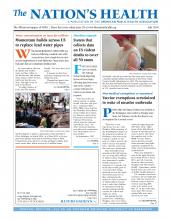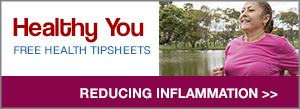Information on the historic All of Us Research Program is reaching people across the country, thanks to local engagement partners and their longtime ties to the communities they serve.
“The work of All of Us — to partner with diverse groups of people to improve the health of future generations — that really spoke to us,” said Kelsey Mahaffey, All of Us project director at FiftyForward, which serves older adults and seniors in the Nashville, Tennessee, area.

In April, members of FiftyForward Donelson Station in Nashville, Tennessee, learned about the All of Us program from FiftyForward peer ambassador Delois Caldwell, right.
Photo courtesy FiftyForward
FiftyForward is one of nearly three dozen official All of Us community engagement partners working to educate and enroll people in the study, which aims to gather data from at least 1 million people for a decade to help speed up health research and medical breakthroughs.
Since its official launch in May 2018, 142,000 people have completed the initial protocol of All of Us, a program of the National Institutes of Health, with 80% of those enrollees representing communities historically underrepresented in research, including over 50% from racial and ethnic minority groups. Gathering a cohort that represents the diversity of the U.S. population is a driving force behind All of Us recruitment work, which ranges from workshops to webinars to peer ambassadors.
In Dearborn, Michigan, the Arab Community Center for Economic and Social Services, an All of Us community engagement partner, recently partnered with Detroit-based Henry Ford Health System to host pop-up clinics where visitors could learn about and enroll in the program.
APHA member Farah Erzouki, MPH, the center’s public health manager, said All of Us is an important opportunity to engage communities that have historically been left out of and underrepresented in health research. In fact, she said the chance to “be counted” is often a compelling recruitment message during outreach events.
“When we heard about All of Us, we knew the stakes were too high not to be involved,” Erzouki told The Nation’s Health. “This is the first research program of this scale to include our voices and communities. It could be the first time that we understand, on such a broad level, what our community is facing.”

All of Us volunteers share information at APHA’s 2018 Annual Meeting and Expo in San Diego. APHA is one of the partner organizations supporting the national research program.
Photo by Michele Late
The center’s engagement activities primarily focus on outreach and education, such as hosting informational events and spreading the word on social media.
More recently, however, the center has been focusing on “bridging the gap between education and enrollment” with events such as the pop-up clinics, Erzouki said. She noted that while the center’s decades-long presence in the community makes it an ideal engagement partner, some people have privacy concerns about having their personal data collected, and so effective messaging should reflect that.
Getting counted is a message that often resonates with rural residents said Laura Hudson, MPA, director of program services and contracting at the National Rural Health Association, an All of Us community engagement partner.
“We want to make sure the populations living in rural places are represented in the All of Us dataset so that their needs can be addressed in the future rounds of research,” she told The Nation’s Health.
The association’s efforts are focused on raising awareness among rural health partners nationwide, not on direct enrollment. To date, the association has distributed educational All of Us materials via webinars and electronic newsletters, potentially reaching over 21,000 rural health practitioners and supporters. The webinars include those specifically tailored to the country’s 42 state rural health associations.
Ryan Kelly, executive director of the Mississippi Rural Health Association and Alabama Rural Health Association, both of which received All of Us mini-grants via the National Rural Health Association to drive engagement locally, said that while technology literacy is a challenge for rural enrollment, “it’s a variable that can be overcome with help.” Over the last year, the two state groups have been able to reach thousands of rural residents and health providers with information about the study, Kelly said.
“It was a no-brainer for us,” Kelly said about the associations’ participation. “Anything we can do to help foster more data collection and help find smart policies and ideas to curb negative health outcomes — we certainly wanted to be a part of it.”
“This is the first research program of this scale to include our voices and communities. It could be the first time that we understand, on such a broad level, what our community is facing.”
— Farah Erzouki
In May, the New York State Public Health Association hosted an All of Us information booth at its annual meeting, which welcomed about 250 attendees, including health officials from every county in the state. APHA member Erin Sinisgalli, MPH, MCHES, executive director of NYSPHA, said the outreach event — supported with an All of Us mini-grant via APHA, an official community engagement partner — encouraged visitors to spread the word back in their home communities.
“This is a really exciting project that not only gives people the chance to enroll themselves, but the chance to be part of something that all of us will be able to use in our public health work,” she said.
FiftyForward was among the first All of Us community engagement partners. Mahaffey said direct, personal interactions typically work best to engage older people.
“It’s a complex program to explain, so we find that the engagement process takes multiple touch points,” Mahaffey told The Nation’s Health.
FiftyForward staff, for example, visit each of the organization’s seven centers every month with laptops and tablets to provide members one-on-one help with the enrollment process.
Mahaffey said another key outreach strategy has been using peer ambassadors — people ages 50 and older already enrolled in All of Us — to engage with older adults in the community.
“They’ve been absolutely instrumental in this work,” she said. “The idea of leaving behind a legacy — that’s really resonating.”
For more on the work of All of Us community engagement partners, visit https://allofus.nih.gov.
- Copyright The Nation’s Health, American Public Health Association












